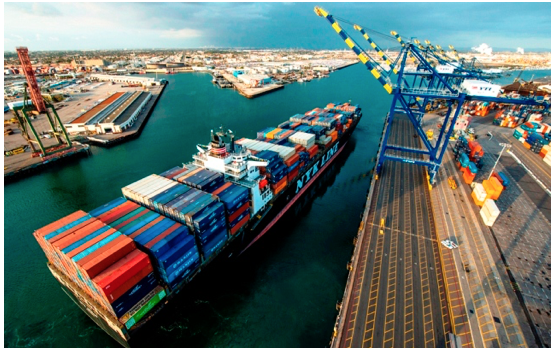CommentsAT LENGTH-Not much crosses the waterfront in Southern California’s twin ports that isn’t in the jurisdiction of the International Longshore Workers Union. Every kind of commodity and product, legal or not, comes here from around the world — 42 percent of all imports into the United States, to be exact. What could possibly go wrong?
According to recent reports from the ports of Los Angeles and Long Beach, cargo volumes are nearly the highest they’ve ever been.
The Port of Los Angeles closed its 12-month fiscal year with total cargo volumes of 9.2 million 20-foot units (TEUs). Through the first half of 2017, POLB reports, container throughput grew by 5.1 percent, compared to 2016 which moved 3.5 million TEUs.
The twin ports also have reported that the combined value of the cargo transiting through the ports amounts to some $450 billion. It would appear that it’s heading for even higher levels of growth in the years to come — as long as there isn’t another recession.
Still, the recent extension of the ILWU labor contract with the Pacific Maritime Association (the employer group) anticipates growth and avoids any potential disruption to the “supply chain” because of labor strife. This benefits both sides, since neither labor nor management trust what the Trump administration would do with an extended labor dispute on the West Coast. Things could be worse.
Even the recent Clean Air Action Plan known as CAAP, and the zero-emissions agreement between the two ports anticipate significant growth in cargo volumes that some estimate could reach as high as 250 percent of the current rate. Science predicts that if they don’t reduce the exhaust emissions starting now, the increase in cargo volumes will only expand, contributing even more to global warming and endangering the health of millions of Southern California residents. The ones who would be most impacted are those who live or work near the ports. After all of the advancements to lower those emissions within the past 17 years, the ports of Los Angeles and Long Beach still remain the single largest source of pollution in the state. So, what’s the problem?
The weak link in this 4450 billion supply chain are the troqueros — the thousands of mostly immigrant truck drivers hired and miss-classified as independent contractors to haul containers in and out of the ports. The troqueros lease their trucks from the company, pay their own expenses and get paid on a per haul basis. In the end, they are some of the lowest paid workers in the harbor and they don’t like it.
In fact, they’ve gone on strike 15 times in the past several years and have gone to court suing the various companies over labor abuses. They have won many of these cases, but they still remain an abused labor group.
International Brotherhood of Teamsters Vice President Fred Potter spoke of the plight of the troqueros at a San Pedro Democratic Club meeting at Ports O’ Call Restaurant this past July and asked for support. His spiel included arguments I’ve heard before, but this time I just happened to be sitting next to ILWU International Vice President Ray Familathe when I heard them.
Familathe became notably more agitated as Potter talked about the Teamster’s drive to organize the troqueros. During the question-and-answer period, Familathe blasted Potter for entering the ILWU’s jurisdiction without so much as a phone call or a diplomatic communication to organize workers on “our waterfront.”
The issue also came up last year when then-Congresswoman Janice Hahn wanted to hold a press conference about the plight of the truckers “on the waterfront.” After some terse words with then-Local 13 President Bobby Olivera Jr. The conference was symbolically moved across Harry Bridges Avenue, oddly enough, to less contested territory. Still, the dispute between the International Brotherhood of Teamsters and the ILWU goes back decades to when Harry Bridges himself was president of the ILWU International and the jurisdictional battles were over inland warehouse jobs.
So, the answer to the questions about what could possibly go wrong with the goods movement industry on the waterfront and why the troqueros still don’t have protections as workers all comes down to the head-butting dispute between these two major labor unions. It’s an issue past mayoral administrations, harbor commission boards and port administrators have never wanted to touch.
The crux of the matter has as much to do with the Teamsters raiding ILWU locals in San Francisco and Sacramento as it does organizing on the San Pedro waterfront. In the end, the greater threat to all workers may well be automation and not who represents the unorganized workforce. Neither side seems well prepared to train the next generation for the onslaught of robotics.
One thing is for certain, if the ILWU came out to officially endorse these truckers, the stalemate over their status would be over in a minute. But that presumes the Teamsters would come to an understanding that they would have to have peace in other jurisdictions. Who could bring these two powerful unions to the negotiating table?
(James Preston Allen is the Publisher of Random Lengths News, the Los Angeles Harbor Area's only independent newspaper. He is also a guest columnist for the California Courts Monitor and is the author of "Silence Is Not Democracy - Don't listen to that man with the white cap - he might say something that you agree with!" He has been engaged in the civic affairs of CD 15 for more than 35 years. More of Allen…and other views and news at: randomlengthsnews.com.) Prepped for CityWatch by Linda Abrams.
-cw
















